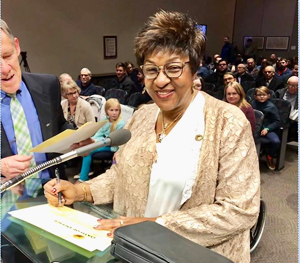
By Rev. Donald L. Perryman, Ph.D.
The fate of millions of people – indeed the future of the Black community itself – may depend on the willingness of those who care about racial justice to re-examine their basic assumptions about the role of the criminal justice system in our society.
– Michelle Alexander
When I hear the expression “to make an example of,” my ears immediately perk up.
The phrase has a long, fraught history in America, especially for Black communities. Since the early 1600s, when enslaved Africans were brought to these shores, the remark “to make an example” has been a government tool to subjugate, control, and instill fear, humiliation, and intimidation. For me, it represents an utterance signaling Blacks to “stay in your place,” conform, or face severe repercussions.
Over 400 years later, this sentiment appears to persist.
Former council member Yvonne Harper’s recent sentencing by U.S. District Judge Jeffrey Helmick highlights this. While she pleaded guilty to accepting money for a favorable vote in 2019, the punishment must be contextualized.
In determining a sentence, judges weigh numerous factors, including legal precedent, deterrence, public opinion, and advisory statutory guidelines. Additionally, they may adjust their decision based on individual elements in a case. In Harper’s situation, her longstanding dedication to the community and character led Judge Helmick to give her a reduced sentence.
Still, many hoped for house arrest, yet Judge Helmick opted for prison to make Harper “an example” and “deter future misconduct by officials.”
Yet, the context behind Harper’s “misdeed” lies not in personal gain but centered on her gesture of offering tee-shirts to community kids to keep them out of trouble by playing basketball. The community acutely recognizes this.

Moreover, the timing of her arrest and court appearances along with three other African American elected officials, amid nationwide protests sparked by the tragic murder of George Floyd, the tumultuous events of January 6 and the resulting state of divisive politics and contentious national court hearings, and a burgeoning local police reform effort at the time of her arrest raises eyebrows.
Might Helmick have been sensitive to potential outrage and, thus, felt compelled to send a strong message through his ruling due to likely negative public sentiment or emotion?
This leads to a pertinent question: Was Harper’s sentencing fair? Although Harper held a position of public trust, should the integrity of her office supersede the broader context of her actions?
The U.S. vs. Musgrave case from the 6th Circuit U.S. Court of Appeals underscores a need for judges to look beyond traditional prison sentences. Especially for those unlikely to repeat offenses, the case asserts that alternative measures might be more just and effective.
This court case dealt with a banker with a stellar reputation who received a one-day prison sentence for an egregious white-collar crime. The prosecution appealed and the appellate court sent the case back for resentencing. In resentencing, the appeals court told the judge that he could be creative in aligning with the sentencing guidelines and still serve as a deterrent. So, the banker was resentenced to the original one day in prison with time-served credit, plus home confinement for six months and two years of supervised release.
The people of District 4 were Harper’s heart, and sending her to federal prison serves no useful purpose given her advanced age.
Knowing Harper, as I do, I can’t help but think of the personal hardships she has previously endured, from the painful loss of her son to suicide to the passion she poured into her district. Prison might not serve justice in this case. Harper has already faced a multitude of losses: her job, reputation, and more. Isn’t that punishment enough?
Equally pertinent is that research and lived experience demonstrate that the criminal justice system disproportionately targets Blacks – and Black politicians. A tarnished reputation and loss of public trust would be considered greater punishments than confinement. For Harper, like in the Musgrove case, community control would have sufficed.
Yet, in the federal system, Harper may serve much less time than Helmick’s one-year plus one-day initial sentence due to further possible reductions and transitions. So, the system “pumped the brakes on her pretty hard,” as Harper’s sentencing is comparatively more merciful than she might have received under other local judges. She has to pay no fines or restitution, and she gets to self-report, which may take a while before going into custody.
Indeed, I do not deny the complexity of judicial sentencing. However, we must reflect on the broader criminal justice system.
Why do Black communities continue to be disproportionately targeted and met with such punitive measures?
Harper’s case might not be the harshest. Still, it serves as a poignant reminder of the intricacies and disparities within our criminal justice system.
Contact Rev. Donald , PhD, at drdlperryman@enterofhopebaptist.org
